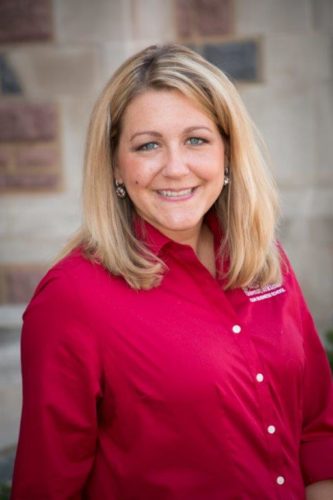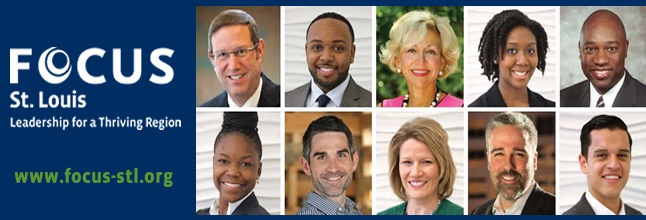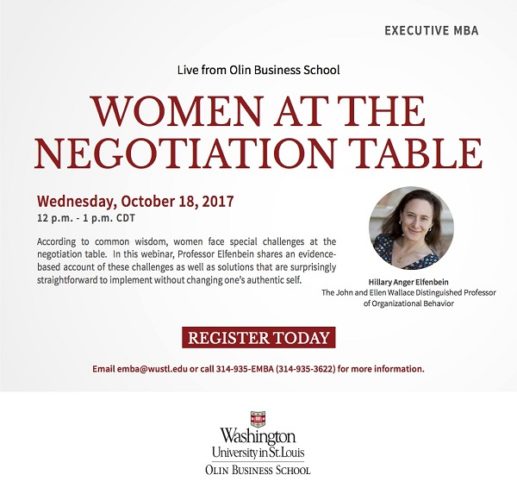The Emerging Leaders program offers a select group of St. Louis’ young and talented the opportunity to receive training to strengthen their leadership and management skills. This competitive program provides participants (ages 22-35) with an increased sense of engagement in the region, as well as the tools to take an active role as the next generation of St. Louis regional leaders.

Angela Bauman, Director of Admissions Operations, Executive MBA, Washington University in St. Louis, Olin Business School
Over the course of the three-month program, Emerging Leaders gain a better understanding of the inner workings of the St. Louis community, an opportunity to develop their personal, professional and civic leadership skills, a chance for personal growth and self-assessment and a diverse network of peers.
FOCUS St. Louis® is the region’s premier leadership organization. FOCUS prepares a diverse base of leaders to work cooperatively for a thriving St. Louis region through our experience-based leadership training, civic issue education and public engagement initiatives.
More than 10,000 people each year connect with FOCUS through our eight leadership programs, numerous civic engagement initiatives and active alumni network. There are multiple entry points into the organization offering varying degrees of opportunity to widen your sphere of influence, engage in authentic relationships with other leaders, learn about critical regional issues, and ultimately impact the quality of life in our region.

Fall 2017 Emerging Leaders Class
Paul Aten, Career Engineer, Ameren Missouri
Angela Bauman, Director of Admissions Operations, Executive MBA, Washington University in St. Louis, Olin Business School
Heather Benz, Environmental Scientist, AECOM
Andrea Billadeau, Global Regulatory Strategy & Operations Communications Specialist, Monsanto
Evita Caldwell, Freelancer
Lauren Campbell, Recruitment Manager, Girl Scouts of Eastern Missouri
Rebecca Corson, Associate Attorney, Hamilton Weber LLC
Jennifer DeRose, Green Dining Alliance Program Manager, St. Louis Earth Day
Alex Elmestad, Director of Learning & Engagement, Contemporary Art Museum St. Louis
Meredith Frey, Marketing & Brand Manager, Arcturis
Nadia Ghasedi, Associate University Librarian, Washington University in St. Louis
Ally Gramlich, Senior Digital Marketing Coordinator, Anders CPAs + Advisors
Galicia Guerrero, Manager, Community Relations, Youth Learning Center & The Biome School
Glennetta Haymon, Operations/Anti-Money Laundering Analyst, Citi
Troy Heumphreus, Senior Specialist – Key Account Support, MasterCard
Jermya Jackson, Operations Coordinator, SSM St. Louis University Hospital
Cami Kasmerchak, Beyond Jobs Operation Manager, Mission: St. Louis
John Kilper, Attorney, Hamilton Weber LLC
Amela Kuckovic, Assistant Project Manager, St. Louis Economic Development Partnership
Rebecca McBride, Membership & Annual Fund Manager, Missouri Historical Society
Sarah McCallion, Senior Account Executive, FleishmanHillard
Kei-Shae McCrary, Retention Specialist, Southeast Missouri State University
Diona Mills, Audit Team Leader, Federal Reserve Bank of St. Louis
Andrew Mitchell, Officer/AttorneyGreensfelder, Hemker & Gale, P.C.
Aryka Moore, Attorney, Weathers Law
Ashley Morris, Trainer, Cognizant
Emma Morrow, Teen Outreach Program, SpecialistWyman Center
Katy Peace, Marketing & Digital Media, ManagerForest Park Forever
Justin Peters, Marketing Executive, J.W. Terrill, a Marsh & McLennan Agency LLC Company
Elise Puma, Associate, Thompson Coburn LLP
Brian Randazzo, Business Development Leader, Arcturis
Ellen Tisdale Brazelton, Project Specialist, MilliporeSigma
Tobias Wall, WriterGorilla 76, LLC
Justin M. Wilson, Assistant Director of Admission, Fontbonne University
Source: Focus St. Louis news release.




 Hillary Anger Elfenbein
Hillary Anger Elfenbein





